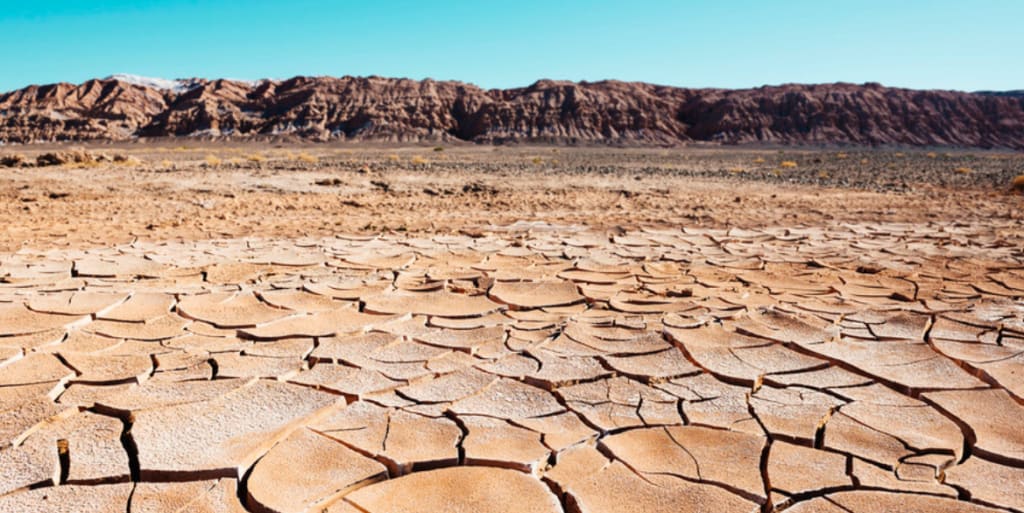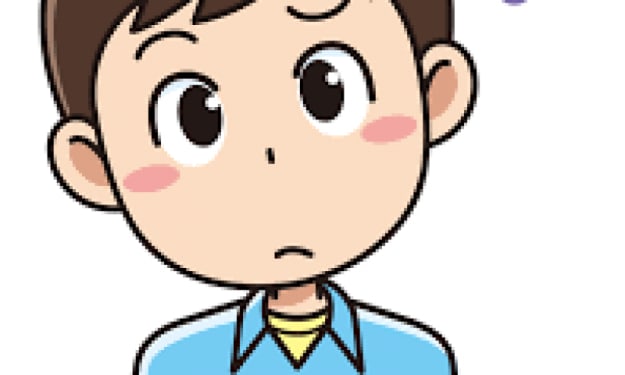Orakne's Discovery - Part I
The greatest discovery of an alien's history

The sky was totally clear. No evidence of clouds, for they did not exist anymore. The air was boiling. It was 85 degrees Celsius. The ground was barren. Nothing was in it but rocks and soil. It was a place renounced by living creatures. Nothing was animated. It was a remote point. There was total silence that was deafening. The sun could burn humans who had lived five millennia ago. The place was planet Earth. Destructed… ruined… and lifeless.
Orakne stepped down from his ship. There was a feeling of weight gain. His planet has a low gravitational pull. Yet Earth’s gravity has not changed, its natural way of creating life had ceased. Orakne walked a few steps. He looked around. He saw nothing except rocks on the surface and an empty sky above. He stooped to pick up a small rock. Then he analyzed it using his intellectual ability. The small rock could still support living matter. But it would take a long time to evolve because organisms must first adapt to the high solar radiation of the planet. He dropped the rock from his smooth and translucent palm.
Orakne is an inhabitant of Genebiev, a planet in Magellanic Galaxy. Fond of space travel and discovering life in any part of the cosmos, he intentionally went to the Milky Way Galaxy and visited a planet that is known to him. He had thought of it as a mysterious planet when his grandfather had talked about it. His grandfather would say, “Orakne, my great-grandfather knows planet Earth. His ancestors told him about the planet. It is a better planet for everyone. It is a dream to live there for every cosmic race.” Orakne was just a kid at that time. Now that Orakne was already on Earth, it disappointed him to see the place. His imagination of it, which was nurtured by his grandfather, differs totally from the scene he was seeing now. Earth was lifeless and inhabitable. Yet he could survive because, in Genebiev, solar radiation is almost similar to that of Earth now.
Orakne’s structure is akin to humans. He stands almost as tall as the famous human basketball player of the 20th century Dennis Rodman. His skin is translucent, closely alike with that of a jellyfish. His torso is cylindrical, from his waist up to his chest. He has slender legs and arms that have smooth yet firm muscles on his calves. He has no hair on his body. It is the smoothness and slipperiness of his skin that protects from and adapts to high solar radiation. His face: he has bulging eyes, a flat nose, and a mouth without lips. He has ears like a piggybank’s hole.
He could see things in the past by holding an unnatural subject and concentrating on it. He could recall the past except on his own planet since he has been exposed to the things there almost half of his life. Every member of his race can do it. They consider it as a natural gift from their planet. But the irony is that they could not use it on their own planet. They could not recall the past of their planet. They use that talent when they visit other planets. But only a few of them could visit planets, and one of them is Orakne.
Orakne has never seen a human. His grandfather had never seen one too. His grandfather’s great-grandfather had pictured humans. Then his grandfather had passed the idea to him. He had visualized it.
Orakne roved the lifeless place to look for something useful for his discovering, something human-made that would enable him to learn the past of the place. For an hour, he did not see any. After a few hours of wandering, he became tired. The infirmity might be because of the high solar radiation of the place. He took a rest for a while. He saw a rock, which was formed by time, like a table without legs. He sat on the rock. Then Orakne fell asleep.
Orakne’s being asleep is a good way to learn the past of the place. One thing Orakne never discovered about his talent is that, when he sleeps in a place he has visited, he will dream about the past of that place. He had gone to only a few planets. He had orbited other planets and had taken a peek from his spaceship, but this was the first time Orakne had experienced his hidden ability of dreaming of the past.
Orakne would never touch down on a planet if he feels it’s detrimental. “Orakne, don’t ever land on planets you feel are dangerous,” his father Olduruk would always warn him. But his grandfather’s description of Earth gave Orakne a challenge and excitement to see for himself the planet. He did not bother to think about his father’s warning. Besides, he felt something different from Earth. There was that feeling of connection between him and the planet.
Orakne had a dream of Earth while asleep. It was staggering. That was the time when he first saw humans. He also spotted the events that had occurred millennia ago. The dream was a nightmare for humans, but for Orakne it was simply just a dream. He saw destruction clearly. He was not used to those images because on his planet there are none of those. He did not even understand what the dream was all about.
Humans living in different countries all over the world are in strife. They kill each other through weapons. There occurs the First World War, and then the Second World War. Carnage pervades. Millions of humans are exterminated. After the two world wars, the planet’s atmosphere is damaged because of the irresponsibleness of humankind. Factories, vehicles, garbage, pollution are ruining the atmosphere. The temperature gradually becomes high as the malevolent deeds continue, provoking weather changes, causing floods, drought, and typhoons.
Millions of humans die. Inhabitable places widen because of sudden increases in temperature.
The atmosphere continues to be ruined, which resulted in the escape of hydrogen gas into space. Strife from country to country continues as the effect of unending discrepancies of ideologies, religions, and principles. Afterward, another world war occurs. World War III. It causes the planet to lose forty percent of its population. Following the war, which uses nuclear weapons of mass destruction, nuclear virus, and other biological armaments, unproductive areas extend and the numbers of fauna and flora species decline.
Water becomes less because of the incessant escape of hydrogen and oxygen into space. The ruining of the atmosphere becomes inevitable. As a result, high solar radiation becomes a dilemma for every human being. Here, humans resort to hiding in underground constructed places. However, they cannot survive because of food and water scarcity.
The last human on ruined Earth gives away. Humankind’s existence ceases.
The spaceship’s alarm suddenly woke Orakne up. He found himself lying over the rock. He got up and ran to the spaceship. As he climbed inside his ship, he learned that an alarm had sounded because of the solar radiation on the planet’s surface. The radiation was close to the limited temperature his body can resist. He then maneuvered the ship and orbited the planet once.
After one orbit, Orakne landed in the darkest part of Earth. It was part of Asia. Nothing bright was discernible for a human eye except the cosmic bodies in space. The place was in total silence. The natural sound of cicadas at night when the earth was still alive was lost.
Orakne stepped outside of his ship. The air that encompassed the surrounding was in so much low temperature that he chilled. It was as cold as the north and south polar caps during Earth times. Yet there was no snow or water, only rocks, and barren soil. Earth had become a picture of its moon. Orakne went back to his ship and wore his suit to protect his body from the cold temperature.
Orakne’s sense of sight is thrice as clear as a normal human, so he sees anything that surrounds him during the night. There was only the silhouette of rocks bulging in the grounds. He trod to the nearby place. While walking, his thoughts were into remembering the things he had seen in his dream lately. In a moment, he accidentally fell into a vacated gorge that a foot-thick soil had covered. His simple step eroded the soil, sliding him into the gorge.
The gorge was almost ten meters deep. Its width is a meter wide. Orakne got cuts on his back and calves. He stood up and examined the dark, hollow place. Beside his right foot, there was something bright that grabbed his attention. It was ingrained in the rock like a fossil. He tried to pick the thing, but he could not. He hunkered to hold the rock, then compressed it and concentrated to break it. Afterward, the rock broke. He picked up the item. It was a gold wristwatch. It was still clicking. He could hear it.
Orakne climbed up, going outside of the gorge. He went to his ship and entered to heal the cuts.
The golden wristwatch amazed Orakne. They did not find it on his planet, so he did not know what it was. He looked at it now and then. He pondered. His curiosity about the thing spurred him to see its past. He closed his eyes and concentrated while holding the golden wristwatch.
Humans are busy working in a place with machines. It is a factory of wristwatches. The finished products are put in small boxes and are distributed to another place.
“How much is this?” asks the bald man who is holding the watch.
“That’s Rolex, Sir. It’s gold. It is 5,000 dollars,” says the vendor.
“I’ll buy this,” the man offers a small suitcase. The vendor opens it and counts the money inside. “Is that fine?” asks the bald man.
“Absolutely, Sir,” says the vendor.
Then the bald man goes away with the small box.
The bald man arrives in a building’s facade. He gets out of the car, enters the building, and takes the lift. He pushes the number 25 button inside the lift, which then ascends. When the lift halts and opens, the bald man walks, heading to a vast room. It is a laboratory. He takes off his black leather coat and wears a white coat. He is a scientist.
In the laboratory, a woman who also has the same coat meets him. “Harry, we have a problem,” says the woman in a worried tone.
“What is it, Sarah?” asks the bald man, who seemed calm.
“The pig sample we injected with JF-31 bloated and exploded inside the compartment.”
“What? It can’t be?” Harry’s expression turns into disappointment.
Harry has been working on a substance called JF-31 cells for five years. He has been aiming to create biotechnology that can prolong human life on earth by employing jellyfish cells. Jellyfishes have the longest life span on earth.
Using his electrical microscope, Harry observes the cell of the pig sample duplicates as soon as the JF-31 cell combines with it. It shows that JF-31 would enable to prolong the life of the pig cell. However, when he tests it again to the pig’s whole body, after a day the pig bloats and explodes. It cannot resist the duplication of JF-31 cells. It seems his calculation of JF-31 cells formula using other compounds exceeds the tolerable state of the pig cells.
Harry, with his assistant Sarah, resumes working hard to achieve fauna life-prolonging. His golden wristwatch is the witness of that endeavor. In the end, Harry and Sarah make it.
“Sarah, I think I made the right substance composition for JF-31,” he says to his assistant. “We need to test it again from animals with a short lifespan,” he adds.
They get the butterfly sample since it’s an insect with a brief span of life, only two to three days. Five days have passed, but the butterfly is still alive and active. They are confident that they’ve got the right formula. They again test the cell on five mice. It succeeds. The mice’s lives are prolonged by five years. They test JF-31 on other mammals and it is effective. By then, Harry and Sarah are in their late forties.
“At last, we made it, Sarah!” He hugs and kisses her.
Harry applies it to humans. And his specimen is none other than himself. He injects himself with the help of his lover Sarah. In a few weeks, Harry does not feel any changes in his body, neither he has body system failure. He is so sure that JF-31 would prolong his life. So he asks Sarah to be injected with JF-31 too so that the two would be together for the rest of their lives, or even forever. It is assumed ‘forever’ since the butterfly sample is still alive for more than a decade.
A year passes by; Harry and Sarah become stronger and youthful. They become younger than a 40-year-old human being. Their colleagues become old and others die, but they still live a youthful life.
Out of curiosity, Harry and Sarah plan to inject JF-31 into a test-tube baby. They want to know if the baby would still grow old or would remain a baby. They inject it into the baby’s right thigh. As time goes on, the baby grows but his aging pauses when he reaches the age of 30. That time, Harry’s and Sarah’s built seems to be they are still in their forties. Their success remains secret until the world changed.
It is 2121 when the greenhouse effect becomes worse. A year later, the Third World War occurs. Harry and Sarah have no choice but to disclose their discovery to the United States of America’s government to use it in prolonging the lives of the soldiers. Yes, the cell could prolong the lives of the soldier except if bullets hit them and then they bleed to death. The US government uses the cell for its greatest combatants. Because of this, they defeat Russia, South Korea, China, and other Asian countries, which are not members of their allied forces.
The operation of injecting the soldiers with JF-31 is only known to a few people. The head of the US Armed Forces, FBI, CIA, and the US President are the people who are informed about it. But the soldiers do not know what has been injected into them.
A decade overtakes time. Some 20,000 U.S. and European soldiers stay younger. Because of this, the opportunity to do anything criminal has increased. They become abusive.
Harry and Sarah are very disappointed with the situation. They think of researching to stop JF-31 cells from prolonging the lives of the soldiers but they fail.
Following the critical condition of the world, the atmosphere has become worse than ever. There is a great flood as north and south polar caps have melted. Many humans have been drowned, including some soldiers carrying JF-31 cells. Then, after months of continuous floods, many places on earth cannot sustain life. Solar radiation has increased. The water on the planet has gradually depleted. Hydrogen has been going out of the planet. Scarcity of food and water results in strife between the remaining people on earth, which is estimated at a thousand.
Another century comes, human existence ceases.
Millennia after, all living organisms have been wiped out on the surface of the planet.
Orakne’s consciousness came back. He was sitting in front of the console of his ship. He could not believe what he saw. The strife, war, unending greediness, selfishness, and irresponsibleness of humankind lingered in his thoughts. In a minute, in the console’s screen there appeared a face closely similar to his. It was his father’s face, transmitted through radio waves from his planet. “Orakne, you must return here. Your grandfather is dying,” said the face on the screen.
Orakne operated the ship. It lifted and traversed the space until only a dot of light was seen in the heavens. His ship moves as fast as the speed of the light.
Author's note: Please continue reading in Part II
About the Creator
M.G. Maderazo
M.G. Maderazo is a Filipino science fiction and fantasy writer. He's also a poet. He authored three fiction books.






Comments
There are no comments for this story
Be the first to respond and start the conversation.